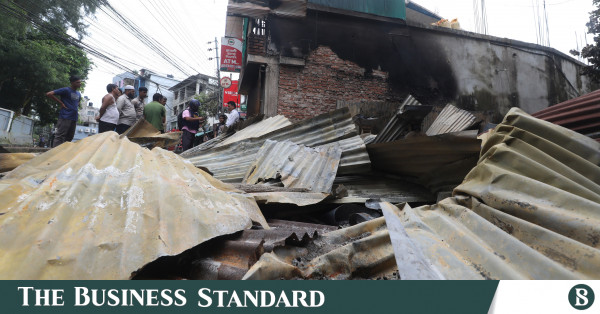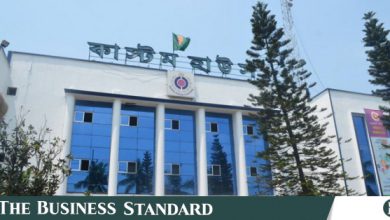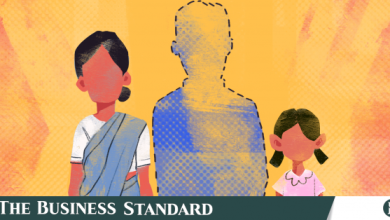Fear, tension shroud hills after violence


Members of both ethnic minority and Bengali communities expressed fear about leaving their homes, even for daily necessities, and called on the administration to quickly restore order
Photo: Mohammad Minhaj Uddin
“>
Photo: Mohammad Minhaj Uddin
The situation in the hilly districts of Rangamati and Khagrachhari remained tense on Saturday (21 September) as a 72-hour road and blockade halted long-distance transportation, following violent clashes erupted in the previous two days that left four people dead, over 50 injured, and shops and houses set ablaze.
On Saturday, a heavy presence of the army, police, and other law enforcement officials was observed at key junctions across the districts.
Members of both ethnic minority and Bengali communities expressed fear about leaving their homes, even for daily necessities, and called on the administration to quickly restore order.
Meanwhile, forty-five eminent citizens and rights activists issued a statement on Saturday on the issue demanding investigation and prompt legal action against those responsible.
Photo: Mohammad Minhaj Uddin
“>
Photo: Mohammad Minhaj Uddin
“We are deeply concerned and saddened by these incidents and the casualties. We condemn the violence,” they said in the statement.
The blockade, which began at 6am on Saturday and also includes the hill district of Bandarban, was announced on Friday following clashes in Khagrachhari and Rangamati.
A platform named “Aggrieved Jumma Chhatra Janata” called the blockade to protest incidents of attacks and arson, demanding the punishment of the culprits.
Meanwhile, transport association leaders in Rangamati called for an indefinite strike starting on Saturday to protest the burning of CNG-run auto-rickshaws during the widespread violence that left at least four dead and over 50 injured.
Due to the blockade, no passenger buses departed from Rangamati to Khagrachhari or Bandarban. Goods transport trucks and pickup vehicles were also halted in the three districts.
Vehicles from Shanti Paribahan on the Chattogram-Khagrachhari route were also grounded Saturday.
Nirnimesh Dewan, president of the Jeep Owners Association, told TBS, “Our vehicles operate from Khagrachhari to Chattogram and various upazilas and villages in Khagrachhari. The service is closed due to the blockade.”
Mizanur Rahman Babu, general secretary of the Rangamati District Rickshaw Pullers Union, said, “We are protesting against several issues, including assaults and extortion on the roads. We will not withdraw from the movement until our demands are met.”
Three advisers – Home Affairs Adviser Lt Gen (Retd) Md Jahangir Alam Chowdhury, CHT Affairs Adviser Supradip Chakma, and Local Government, Rural Development and Cooperatives Adviser Hasan Arif – met local political parties, transport leaders and different organisations centring the rounds of violence in three hilly areas on Saturday.
Rangamati becomes a ghost city
The area from Kathaltali to the Stadium in Rangamati still bears the scars of Friday’s violence, with damaged shops, businesses, infrastructure, and vehicles scattered throughout the hilly district town.
The city was unusually calm on Saturday following the violence that left at least one person dead and many injured.
Photo: Mohammad Minhaj Uddin
“>
Photo: Mohammad Minhaj Uddin
During the violence, among the most affected establishments were Rupali Bank, Pubali Bank, Shimanto Bank branches, Regal Furniture showroom, and Rangamati Popular Diagnostic Centre.
At least seven vehicles belonging to the Chittagong Hill Tracts Regional Council were vandalised during the clashes.
Sumon Chakma, owner of Cooling Corner in Banrupa Bazar, told TBS, “My shop had goods worth Tk8 lakh. I couldn’t save them.”
Saturday morning, nearly all shops in Rangamati city were closed, vehicles remained halted, and the streets were noticeably empty. Various hotels, shops, and businesses in Banrupa were shut down, as were establishments along Rajbari Road, College Road, and in the area around the Deputy Commissioner’s Office.
Sushil Prasad Chakma, president of the Rangamati Reporters Unity, told TBS that some journalists’ vehicles were set on fire during Friday’s violence. These concerns were raised with advisers, including the home affairs adviser, at a meeting held on Saturday at the Rangamati cantonment.
“We have requested law enforcement officers to assist journalists in carrying out their professional duties,” he said.
According to local sources, on Friday morning, in response to Thursday’s clashes between ethnic minorities and settler Bengalis in Dighinala, Khagrachari, local students staged a protest march in Rangamati.
As the procession reached the Bonorupa market, rumours and tension spread throughout the town, creating panic among residents. At one point clashes broke out between Bengalis and ethnic communities in Rangmati too.
On Wednesday, a man named Md Mamun was reportedly beaten to death on suspicion of theft in Khagrachhari.
Over the incident, clashes on Thursday and at one point and miscreants set fire to about 50 shops in Larma Square in Dighinala upazila.
Later at night, shootings were reported in the Narankhaiya area of Khagrachhari sadar.
The incidents led to heightened tensions and heavy law enforcement deployment in both regions. Amid deteriorating situation, local administrations imposed Section 144 in the two districts.
Damage to Maitri Vihar estimated at Tk30 lakh
The monks in charge of Dakshin Kalindipur Maitri Vihar in Rangamati’s Kathaltali area reported that Friday’s attack by miscreants caused over Tk30 lakh in damage.
They stated that a group of 50-60 attackers broke into the Vihar around noon, vandalising donation boxes, chairs, tables, furniture, and souvenirs.
Nandasara Bhikkhu said the attackers also looted about Tk15 lakh in cash, including funds from the donation box.
“We urge the government to conduct a fair investigation and ensure the culprits are brought to justice,” he said.
Prompt legal action demanded
In the statement of prominent citizens and activists, it was demanded that a fair, impartial, transparent, and high-level investigation into the violence in Khagrachhari and Rangamati, as well as bringing to book those responsible.
Referring to the casualties of the July uprising during the student-led mass protests, the citizens said, “If the same incident is repeated in the hills and not properly investigated and prosecuted, it will be considered as a disgrace to the ‘new Bangladesh’ achieved by the blood and sacrifice of the students.”
Incidentally, the statement added, it should be noted that such incidents of violence are not the first in the hill tracts. “We know of many instances of such clashes, violence and casualties in the past few decades, including the recent past.”
Radical change in the governance system and structure of the Chittagong Hill Tracts is necessary and the governance structure should be restructured as per the Chittagong Hill Tracts Treaty, 1997, the citizens said.
Deployment of the army in those areas, overall security and protection of human rights were also called for.
Some of the notable signatories in the statement include – Sultana Kamal, human rights activist and former adviser to the caretaker government; Prof Anu Muhammad, Democratic Rights Committee member; Khushi Kabir, women’s rights movement leader and human rights activist; Rasheda K Chowdhury, former adviser to caretaker government; Dr Iftekharuzzaman, TIB executive director; and Subrata Chowdhury, senior advocate of the Supreme Court.
The CHT Commission and International Work Group for Indigenous Affairs (IWGIA) also expressed deep concern over the ongoing violence in the hilly districts.
In a joint statement on 20 September, the organisations said, “Without any proper investigation, Bangalis placed the blame on the Jummo community, despite the officer-in-charge of Khagrachari Police Station stating a different narrative. Using this as a pretext, Bangalis launched violent attacks on Jummo individuals in Dighinala upazila, Khagrachari, and set their properties ablaze.”




